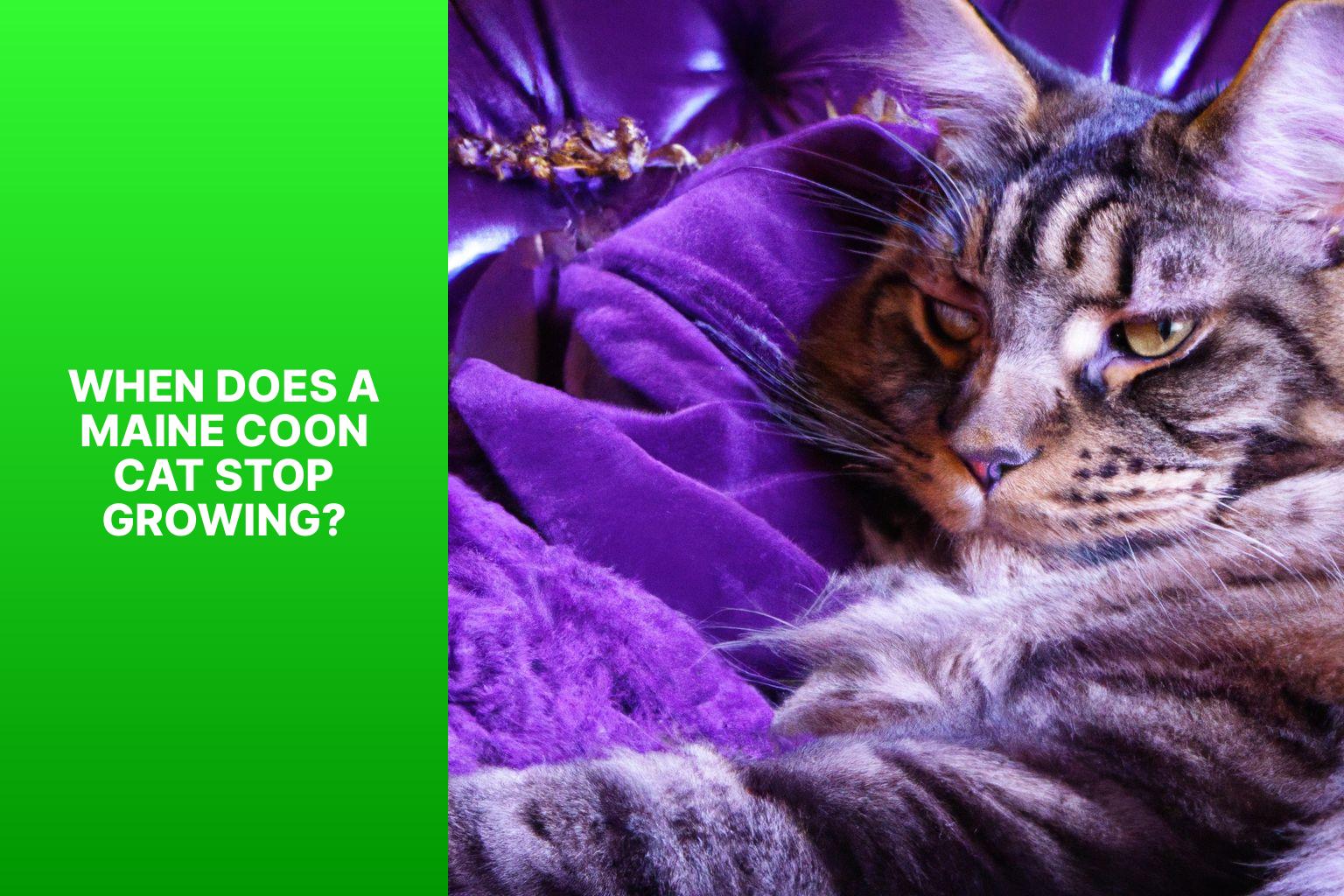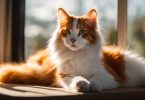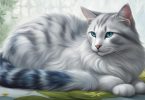Understanding the Growth of Maine Coon Cats
Maine Coon cats are known for their large size and majestic appearance. As pet owners, it is important to understand the growth process of these magnificent felines. By gaining insight into when Maine Coon cats stop growing, we can ensure their health and well-being throughout their development.
Maine Coon cats are a distinct breed known for their robust build, tufted ears, and long, bushy tails. They are one of the largest domestic cat breeds, with adult males weighing between 13 to 18 pounds and adult females ranging from 8 to 12 pounds. The growth of Maine Coon cats is influenced by several key factors, including genetics, nutrition, and overall health.
When it comes to the question of when Maine Coon cats stop growing, it is essential to understand the growth timeline. Maine Coon cats experience a gradual growth process, taking approximately three to five years to reach their full size and maturity. It is important to note that individual growth rates may vary, and some Maine Coon cats may continue to grow past this time.
Various factors can impact the growth rate of Maine Coon cats. Genetics play a significant role, as cats from certain bloodlines may grow faster or slower than others. Nutrition plays a pivotal role in ensuring proper growth and development. Providing a balanced and high-quality diet that meets their nutritional needs is crucial. Adequate exercise and mental stimulation also contribute to healthy growth and overall well-being.
Recognizing signs of growth completion is vital for Maine Coon cat owners. Physical indications, such as stabilization in weight and size, can suggest that the cat has reached maturity. Behavioral changes may also occur, including a calmer demeanor and reduced playfulness.
To promote healthy growth in Maine Coon cats, it is essential to provide them with the right nutrition and feeding guidelines. Consult your veterinarian to determine the appropriate dietary requirements for your cat based on their age, weight, and activity level. Ensure they have access to regular exercise and mental stimulation to support their overall growth and development.
If you have any concerns about stunted growth or inquiries about growth patterns, it is best to consult a veterinarian. They can assess your Maine Coon cat’s specific needs, provide guidance on their growth progress, and address any potential issues that may arise.
By understanding the growth process of Maine Coon cats and providing them with the necessary care, we can ensure their optimal growth, health, and happiness.
Key takeaway:
- Maine Coon cats have a unique growth timeline: Understanding the growth stages of Maine Coon cats is essential for their proper care and development.
- Factors affecting the growth rate: Various factors, including genetics, nutrition, and environment, can influence the growth rate of Maine Coon cats.
- Recognizing signs of growth completion: Physical indications and behavioral changes can help identify when a Maine Coon cat has reached maturity.
Understanding the Growth of Maine Coon Cats
Maine Coon cats have a unique growth pattern, and understanding the growth of Maine Coon cats is essential for their health and development. During the first year of their lives, Maine Coon cats experience rapid growth and reach their full height by 9-12 months. Their development continues until they are 3-4 years old.
When it comes to weight, Maine Coon cats can vary. Adult males typically weigh between 13-18 pounds, while females usually weigh between 8-12 pounds.
Proper nutrition plays a crucial role in the growth of Maine Coon cats. It is important to provide them with a balanced diet that is rich in protein and essential nutrients. This ensures their overall well-being and helps prevent obesity and related health problems. Monitoring their weight regularly is also vital in maintaining their health.
Regular veterinary check-ups are necessary for Maine Coon cats to ensure proper growth and development. These check-ups allow the vet to address any concerns and provide guidance on their growth and nutrition.
What is the Maine Coon Breed?
The Maine Coon breed is a distinctive and beloved cat known for its large size, long fur, and strong build. Maine Coons have tufted ears, lynx-like tufts on their paws, and a slightly curved tail. Their fur comes in various colors and patterns. Maine Coons are friendly, sociable, and good with children and other pets. They are intelligent and playful, enjoying interactive games and toys. Maine Coons require regular grooming, a balanced diet, and exercise to stay healthy.
Key Factors That Influence Growth
- Diet: The type and quality of food that a Maine Coon cat consumes play a vital role in its growth. A balanced diet rich in protein and essential nutrients is crucial for their growth and development.
- Genetics: Genetic factors significantly influence the growth of Maine Coon cats. Genes passed down from their parents determine their size, bone structure, and overall growth potential.
- Health and Wellness: The overall health and well-being of a Maine Coon cat can impact its growth. Regular veterinary check-ups, vaccinations, and preventive care can ensure optimal growth and detect any underlying health issues that may hinder growth.
- Physical Activity: Adequate exercise is essential for the growth and development of Maine Coon cats. Engaging them in play sessions and providing opportunities for climbing and exploring can contribute to their physical growth.
- Environmental Factors: The cat’s living environment can influence its growth. A comfortable and stress-free environment with ample space and stimulating surroundings can promote healthy growth.
When Does a Maine Coon Cat Stop Growing?
Photo Credits: Www.Catcornerblog.Com by Ronald Torres
Maine Coon cats have captivated and charmed pet lovers for decades. But when does this majestic feline reach its full size? In this section, we’ll uncover the truth behind the growth of Maine Coon cats. We’ll explore the growth timeline of these magnificent creatures and dive into the various factors that can impact their growth rate. So, if you’ve ever wondered about the development of Maine Coon cats from kittenhood to adulthood, you’re in for a wild ride!
Growth Timeline of a Maine Coon Cat
The growth timeline of a Maine Coon cat can vary depending on genetics, nutrition, and overall health. Here is a table that highlights the general growth stages of a Maine Coon cat:
| Stage | Age (in months) | Description |
|---|---|---|
| Kitten | 0-4 | Rapid growth and development, about 50% of adult size reached |
| Adolescent | 5-10 | Continued growth in size and weight |
| Young Adult | 11-16 | Gradual growth, nearing adult size and weight |
| Adult | 17+ | Full-grown and mature |
During the growth timeline of a Maine Coon cat, the first four months (kitten stage) are crucial. They experience rapid growth, reaching about half of their adult size. From months five to ten (adolescent stage), they continue to grow in size and weight. Between months eleven to sixteen (young adult stage), the growth rate slows down, and they start approaching their adult size and weight. Once a Maine Coon cat reaches seventeen months and beyond (adult stage), they are considered fully grown and mature.
It is important to note that individual cats may have slight variations in their growth timelines. Factors like diet, exercise, and overall health can influence the growth timeline of a Maine Coon cat. Provide proper nutrition, regular veterinary care, and opportunities for exercise and mental stimulation to promote healthy growth in Maine Coon cats. Consult a veterinarian if you have any concerns about your cat’s growth pattern.
Factors that Impact Growth Rate
Maine Coon cats’ growth rate can be influenced by various factors, including genetics, nutrition, health, exercise, and environment. These factors play a significant role in determining the rate at which Maine Coon cats grow.
Genetics: Maine Coon cats have a natural growth trajectory that is determined by their genetics. Certain genetic variations can result in larger or smaller sizes and can affect their overall growth rate.
Nutrition: A balanced and nutritious diet is crucial for optimal growth in Maine Coon cats. Adequate intake of proteins, vitamins, and minerals, such as calcium, is necessary to support the development of their bones and muscles.
Health: Underlying health issues can have an impact on the growth rate of Maine Coon cats. Illnesses, infections, or hormonal imbalances can slow down their growth or even cause stunted growth. Regular veterinary check-ups are essential to ensure their health is in good condition.
Exercise: Regular exercise and physical activity play a vital role in the growth and development of Maine Coon cats. Engaging in playtime and providing opportunities for exercise help promote healthy muscle and bone growth.
Environment: Creating a nurturing and supportive environment is important for optimizing the growth rate of Maine Coon cats. Providing a stress-free and stimulating environment ensures their optimal growth and development.
Fact: Maine Coon cats are known for their impressive size and can reach their full adult size within 3-5 years.
Recognizing Signs of Growth Completion
As Maine Coon cat owners, we adore watching our furry companions grow and thrive. In this section, we’ll dive into the telltale signs that indicate our Maine Coons have reached their full growth potential. From the physical indications of maturity to the intriguing behavioral changes in adult Maine Coon cats, get ready to uncover the fascinating transformations that await your beloved feline friends!
Physical Indications of Maturity
Physical indications of maturity in Maine Coon cats include:
1. Size: Fully grown Maine Coon cats are large and muscular. Males typically weigh between 13 and 18 pounds, while females weigh between 8 and 12 pounds. Their bodies are well-proportioned and powerful.
2. Facial features: Mature Maine Coon cats have distinctive facial features. They possess a square muzzle, high cheekbones, and large, wide-set ears that contribute to their majestic look.
3. Fur: The fur of mature Maine Coon cats becomes thick, long, and luxurious. It usually has a texture that is resistant to water, and they have a dense undercoat that provides protection from harsh weather conditions.
4. Tail: The Maine Coon breed is renowned for its bushy, long tail. Adult Maine Coon cats have well-developed tails that are approximately the same length as their bodies.
5. Paws: The paws of mature Maine Coon cats are large and round, with tufts of fur between their toes. These paws enhance their ability to walk on snow, as well as their strong grip and dexterity.
6. Overall appearance: When Maine Coon cats reach maturity, they exude a majestic and regal appearance. Their large size, well-defined features, and thick fur give them a striking and impressive presence.
These physical indications of maturity can assist Maine Coon owners in recognizing when their cats have reached adulthood and fully developed into the majestic breed they are known to be.
Behavioral Changes in Adult Maine Coon Cats
Behavioral changes in adult Maine Coon cats can be observed as they go through different stages of development. These changes, known as Behavioral Changes in Adult Maine Coon Cats, are important to understand in order to provide appropriate care and support for your furry friend.
1. Increased Independence: Adult Maine Coon cats, during the stage of Behavioral Changes in Adult Maine Coon Cats, are seen to be more independent and spend more time exploring and engaging in solitary activities.
2. Calmer Demeanor: As part of the Behavioral Changes in Adult Maine Coon Cats, adult Maine Coons exhibit a relaxed and calm demeanor compared to their playful kittenhood. They are less hyperactive and more content with lounging and observing.
3. Affectionate Bonds: Adult Maine Coons, while undergoing Behavioral Changes in Adult Maine Coon Cats, develop stronger bonds with their owners and enjoy cuddling and quality time together.
4. Reduced Playfulness: Adult Maine Coons, as observed during the Behavioral Changes in Adult Maine Coon Cats, are generally less playful than when they were kittens. They still enjoy interactive play sessions, but are more selective.
5. Territorial Behavior: As part of the Behavioral Changes in Adult Maine Coon Cats, Maine Coons become more territorial as they mature, marking their territory and exhibiting defensive behaviors towards unfamiliar animals or people. It is important to provide a safe environment for them to establish their territory.
Understanding these Behavioral Changes in Adult Maine Coon Cats can help you meet their needs and provide appropriate care. Every cat is unique and individual personalities may vary.
True story: When my Maine Coon cat, Luna, reached adulthood, I noticed significant changes in her behavior. She underwent the Behavioral Changes in Adult Maine Coon Cats, becoming more independent and spending more time exploring our backyard, climbing trees and observing birds. Despite her newfound independence, Luna also developed a strong bond with me, always seeking cuddles and playing affectionately. It was remarkable to see how she transitioned from a playful and curious kitten to a confident and affectionate adult cat. I ensured she had interactive toys and a secure outdoor space to satisfy her natural instincts. Luna’s Behavioral Changes in Adult Maine Coon Cats brought immense joy and companionship to our household, strengthening our bond.
Promoting Healthy Growth in Maine Coon Cats
Promoting healthy growth in Maine Coon cats means understanding their unique needs. In this section, we’ll uncover the essentials to ensure their growth is optimal. From nutrition and feeding guidelines to providing adequate exercise and stimulation, we’ll explore practical strategies for giving your Maine Coon the best start in life. So, if you’re ready to unlock the secrets to supporting your furry friend’s growth journey, let’s dive in!
Nutrition and Feeding Guidelines for Growth
To ensure the optimal growth and development of Maine Coon cats, it is important to follow proper nutrition and feeding guidelines. Consider the following aspects for their growth:
– Balanced Diet: It is essential to feed them a high-quality commercial cat food specially formulated for kittens. Look for a product that has the right balance of proteins, fats, and carbohydrates.
– Protein Intake: Maine Coon kittens require approximately 30-40% protein in their diet to support their growth.
– Controlled Portions: It is recommended to feed kittens small and frequent meals throughout the day to prevent overeating and obesity. As they grow, transition to scheduled meals based on their age and weight.
– Adequate Hydration: Always ensure that fresh water is available for the kittens. Incorporating wet food into their diet can provide extra hydration and enhance their overall well-being.
– Consult a Veterinarian: Regularly consulting with a veterinarian is crucial in order to receive tailored guidance regarding your kitten’s unique nutritional needs.
Fact: Maine Coon cats reach their full growth potential in up to four years. Therefore, proper nutrition and feeding are vital for their healthy growth and development.
Providing Adequate Exercise and Stimulation
Providing adequate exercise and stimulation is essential for the growth and development of Maine Coon cats. Regular playtime is crucial, so engage your Maine Coon cat in daily play sessions using toys such as feather wands, laser pointers, or puzzle toys. This will keep them physically active and mentally stimulated. Creating an indoor environment that is cat-friendly is also important. Install climbing structures, scratching posts, and perches to allow your Maine Coon cat to satisfy their natural instincts. It is also necessary to provide environmental enrichment. Rotate toys and provide new objects to prevent boredom and stimulate curiosity. You can incorporate catnip toys, puzzle feeders, or hiding treats. Interactive companionship is also vital for Maine Coon cats. They thrive on human interaction, so spend quality time with your cat through petting, brushing, or simply sitting together. This will build a strong bond and provide emotional stimulation. If you have a secure and supervised outdoor space, it is advisable to offer safe outdoor access. This will provide additional exercise and stimulation. Make sure the area is escape-proof and free from any dangers. To prevent monotony, vary the exercise routines for your Maine Coon cat. They are intelligent and enjoy new challenges. You can try agility training, puzzle toys, or even supervised walks on a leash. By providing enough exercise and stimulation, you can ensure that your Maine Coon cat grows up healthy and happy.
When to Consult a Veterinarian
Wondering when to consult a veterinarian for your Maine Coon’s growth? Let’s dive into the crucial sub-sections: concerns about stunted growth and inquiries about growth patterns. Get ready to discover valuable information and learn how to ensure your furry friend’s growth is on track. Don’t miss out on these insights that will help you provide the best care for your Maine Coon!
Concerns about Stunted Growth
Concerns about stunted growth in Maine Coon cats should be taken seriously. Stunted growth occurs when a cat’s growth is not progressing as expected. Active monitoring and immediate action are important to address this concern.
Here are some factual assertions to consider regarding concerns about stunted growth in Maine Coon cats:
- Regular veterinary check-ups are crucial to assess the cat’s health and growth progress. Regular veterinary check-ups are crucial to assess the cat’s health and growth progress and address any concerns about stunted growth.
- Adequate nutrition is necessary for healthy growth. Feeding high-quality kitten food that meets the cat’s nutritional requirements is essential to ensure healthy growth and address concerns about stunted growth.
- Environmental factors, such as stress and lack of stimulation, can affect growth. Providing a stimulating and enriching environment can promote healthy growth and help address concerns about stunted growth.
- Inappropriate breeding practices can contribute to stunted growth. Responsible breeders should be knowledgeable and adhere to ethical breeding standards to avoid concerns about stunted growth.
- Maine Coon cats have a longer growth period compared to other breeds, and their growth may continue until they reach around four years of age. It is important to consider this extended growth period when addressing concerns about stunted growth in Maine Coon cats.
- Any concerns about stunted growth should be promptly addressed by consulting a veterinarian. They can assess the situation, conduct necessary tests, and provide appropriate guidance to address concerns about stunted growth.
By being proactive and addressing concerns about stunted growth, owners can ensure the well-being and healthy development of their Maine Coon cats.
Inquiries about Growth Patterns
To address inquiries about growth patterns, let’s delve into the subject of Maine Coon cats. One frequently asked question revolves around when these felines stop growing. Generally, Maine Coon cats reach their full adult size between 3 to 5 years old. It is important to note that growth rates can vary due to factors such as genetics, diet, and overall health.
Inquiries about growth patterns often arise from concerns regarding stunted growth. If you notice that your Maine Coon cat is experiencing noticeably slower growth or if you have concerns about their growth rate, it is crucial to consult a veterinarian. They possess the necessary expertise to assess the cat’s health and provide guidance on promoting healthy growth.
Here’s an intriguing fact: Did you know that Maine Coon cats hold the distinction of being one of the largest domestic cat breeds? They can attain lengths of up to 40 inches and weigh between 10 to 25 pounds!
Some Facts About When Maine Coons Stop Growing:
- ✅ Maine Coons are known for being large and elegant cats, often growing to the size of a dog. (Source: Maine Coon Organization)
- ✅ The average growth period for Maine Coons is between three and five years. (Source: Maine Coon Organization)
- ✅ Maine Coons remain kittens for the first full year of their lives and should be fed kitten food until around 15 months. (Source: Maine Coon Organization)
- ✅ Most Maine Coons exceed three feet in length and weigh over 26 lbs, taking longer to grow than other cats. (Source: Maine Coon Organization)
- ✅ It can take up to a year for a Maine Coon to grow its famous mane, which can be thinner in the summer months. (Source: Maine Coon Organization)






